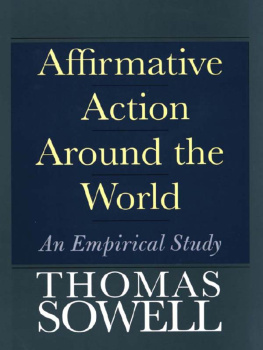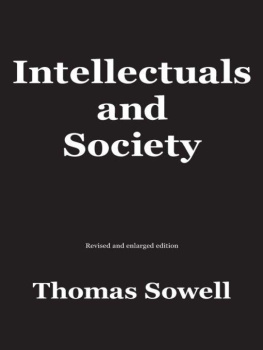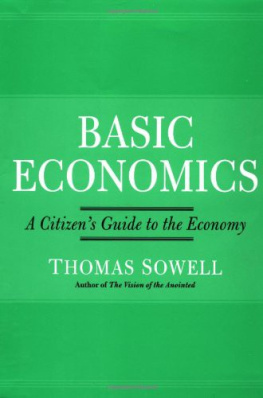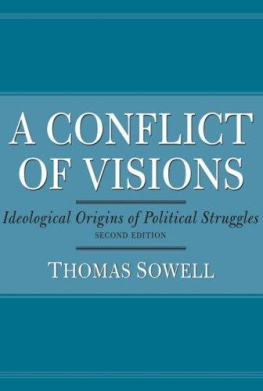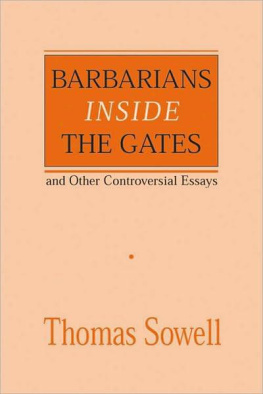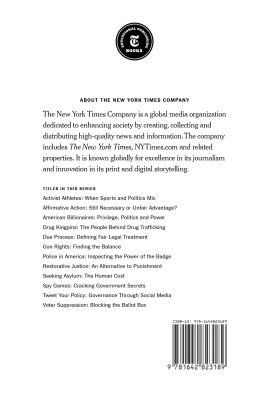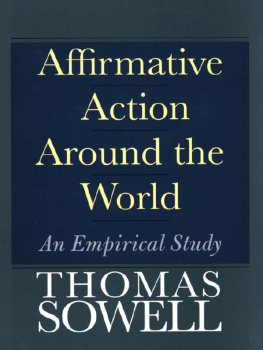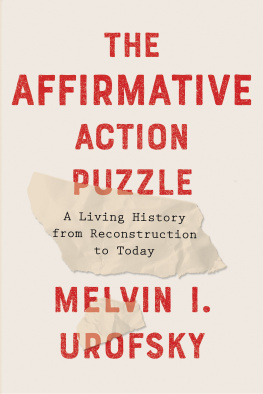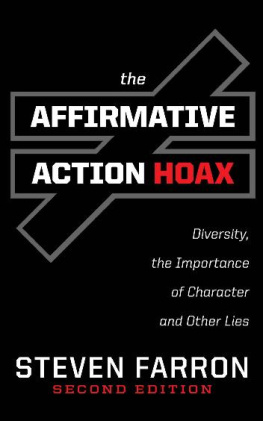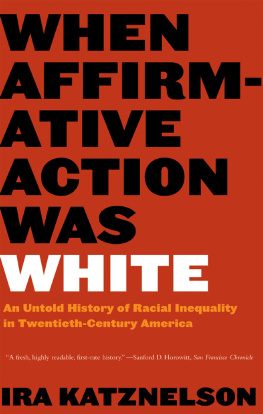Affirmative Action Around the World
An Empirical Study
Affirmative Action
Around the World
An Empirical Study
THOMAS SOWELL
YALE UNIVERSITY PRESS NEW HAVEN & LONDON
Copyright 2004 by Thomas Sowell.
All rights reserved.
This book may not be reproduced, in whole or in part, including illustrations, in any form (beyond that copying permitted by Sections 107 and 108 of the U.S. Copyright Law and except by reviewers for the public press), without written permission from the publishers.
Designed by James J. Johnson and set in Baskerville type by Keystone Typesetting, Inc. Printed in the United States of America by R. R. Donnelley & Sons.
Library of Congress Cataloging-in-Publication Data
Sowell, Thomas, 1930
Affirmative action around the world : an empirical study / Thomas Sowell.
p. cm.
Includes bibliographical references and index.
ISBN 0-300-10199-6 (cloth : alk. paper)
1. Affirmative action programsCross-cultural studies. 2. Discrimination in employmentCross-cultural studies. 3. Discrimination in educationCross-cultural studies. I. Title.
HF5549.5.A34S685 2003
331.133dc21
2003014024
A catalogue record for this book is available from the British Library.
The paper in this book meets the guidelines for permanence and durability of the Committee on Production Guidelines for Book Longevity of the Council on Library Resources.
10 9 8 7 6 5 4 3 2 1
Facts are stubborn things, and whatever may be our wishes,
our inclinations, or the dictates of our passions,
they cannot alter the state of facts and evidence.
JOHN ADAMS
Preface
M anyif not mostpeople who are for or against affirmative action are for or against the theory of af firmative action. The factual question of what actually happens as a result of affirmative action policies receives remarkably little attention. Assumptions, beliefs and rationales dominate controversies on this issue in countries around the world. This book addresses the empirical question of just what does and does not happen under affirmative actionand to whose benefit and whose detriment.
Even an observer highly sympathetic to affirmative action in Malaysia noted in passing, new policies were often put forth without considering what the success or failure of past policies boded for their own prospects. This was not unique to Malaysia. It has been the rule, rather than the exception, in many countries with affirmative action policies, as well as with other policies. The purpose of this book is to consider the actual consequences of affirmative action.
The experience of more than 30 years of researching and analyzing affirmative action policies in the United States has gone into this book. A considerable part of that period has also included the study of similar policies in other countries. An international perspective on group preferences and quotas enables us to examine the arguments on both sides of this issue with a much larger and more varied sample of evidence.
There are few policies more in need of evidence with which to weigh the heated assertions and counter-assertions of advocates and critics. Merely cutting through the jungle of semantics which surrounds controversies over preferential policies in many countries is a formidable challenge. If this book can contribute to clarity on that issue alone, it will have achieved one of its main goals.
In the course of gathering material for the study of affirmative action policies, under the many different names that these policies have in different countries, I have incurred many debts to scholars, officials, librarians and others in many landstoo many people to mention here by name. But I am grateful to them all. My greatest debt, however, is to the Hoover Institution at Stanford University, which paid for lengthy and costly international trips to gather the information presented here. As with my other writings over the past 15 years, my research assistant Na Liu has contributed not only dedicated efforts but also many insights.
THOMAS SOWELL
The Hoover Institution
Stanford University
Affirmative Action Around the World
An Empirical Study
CHAPTER 1

An International Perspective
W hile controversies rage over affirmative action policies in the United States, few Americans seem to notice the existence or relevance of similar policies in other countries around the world. Instead, the arguments pro and con both tend to invoke history and traditions that are distinctively American. Yet group preferences and quotas have existed in other countries with wholly different histories and traditionsand, in some countries, such policies have existed much longer than in the United States.
What can the experiences of these other countries tell us? Are there common patterns, common rationales, common results? Or is the American situation unique?
Ironically, a claim or assumption of national uniqueness is one of the most common patterns found in numerous countries where group preferences and quotas have existed under a variety of names. The special situation of the Maoris in New Zealand, based on the 1840 treaty of Waitangi, is invoked as passionately in defense of preferential treatment there as the unique position of untouchables in India or of blacks in the United States.
Highly disparate rationales have been used in different societies for programs which share very similar features and oftenlead to very similar results. Some group preferences have existed for minorities, some for majorities, some for the less fortunate and some for the more fortunate who feel entitled to maintain their existing advantages over other members of the same society. Today, it is programs for the less fortunate which are called affirmative action in the United States or by such other names as positive discrimination in Britain and in India, standardization in Sri Lanka, reflecting the federal character of the country in Nigeria, and sons of the soil preferences in Malaysia and Indonesia, as well as in some states in India. Group preferences and quotas have also existed in Israel, China, Australia, Brazil, Fiji, Canada, Pakistan, New Zealand and the Soviet Union and its successor states.
Despite how widespread affirmative action programs have become, even the promoters of such programs have seldom been bold enough to proclaim preferences and quotas to be desirable on principle or as permanent features of society. On the contrary, considerable effort has been made to depict such policies as temporary, even when in fact these preferences turn out not only to persist but to grow.
Official affirmative action or group preference policies must be distinguished from whatever purely subjective preferences or prejudices may exist among individuals and groups. These subjective feelings may of course influence policies, but the primary focus here is on concrete government policies and their empirical consequencesnot on their rationales, hopes, or promises, though these latter considerations will not be wholly ignored. Fundamentally, however, this is a study of what actually happens, rather than a philosophical exploration of issues that have been amplyif not more than amplyexplored elsewhere.
LIMITED AND TRANSIENT PREFERENCES
The resurgence of group preferences in societies committed to the equality of individuals before the law has been accompanied by claims not only that these preferences would be temorary, but also that they would be limited, rather than pervasive. That is, these programs would supposedly be limited not only in time but also in scope, with equal treatment policies prevailing outside the limited domain where members of particular groups would be given special help.
Next page
